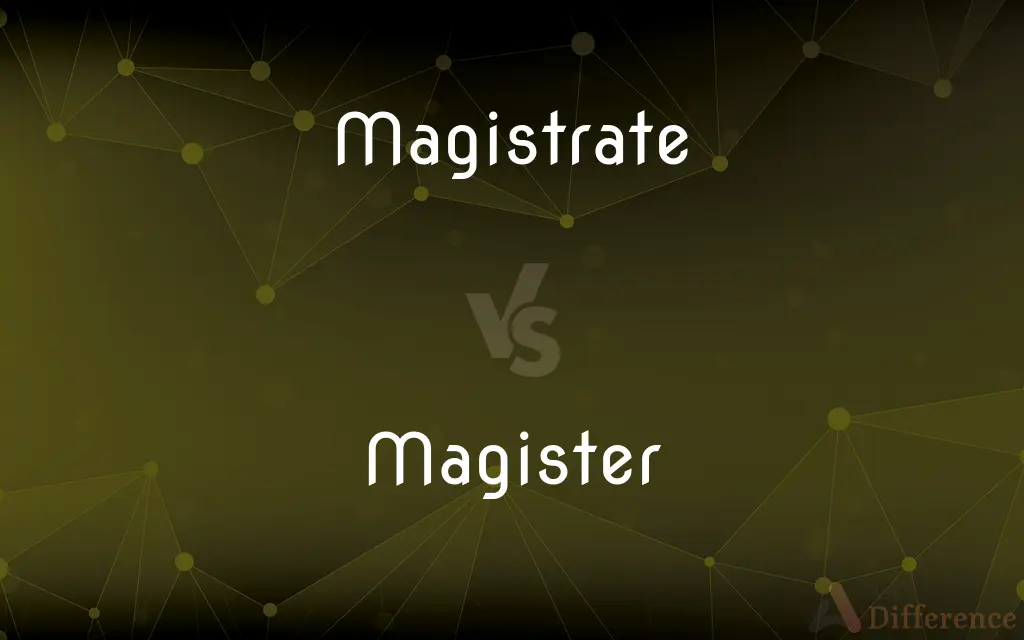Magistrate vs. Magister — What's the Difference?
Edited by Tayyaba Rehman — By Fiza Rafique — Updated on March 28, 2024
A magistrate is a civil officer or judge who administers the law, especially one who conducts a court that deals with minor offenses. Magister, refers to title for various types of educators and officials, often used in academic or scholarly contexts.

Difference Between Magistrate and Magister
Table of Contents
ADVERTISEMENT
Key Differences
Magistrates play a pivotal role in the judicial system, handling legal matters that range from minor civil disputes to preliminary assessments in criminal cases. Their authority can vary by jurisdiction, but they generally have the power to issue warrants, judge minor offenses, and conduct initial hearings. Magisters, on the other hand, were historically recognized as teachers or scholars, particularly in medieval universities. This title was prestigious, denoting expertise and authority in a specific field of study or instruction.
The role of a magistrate is primarily legal and focuses on the administration of justice within a specific geographic or judicial area. They are appointed or elected to oversee the application of the law, making decisions based on legal statutes and precedents. Conversely, a magister's role was predominantly educational, providing instruction, guidance, and mentorship to students in various disciplines, symbolizing a mastery over a particular subject or field.
In modern contexts, the term magistrate is still widely used and recognized within legal systems around the world, indicating a specific function and level within the judiciary. The term magister, however, has become less common and is primarily used in academic or historical references, though its derivative forms, like "magistrate" or the English "master," continue to influence contemporary titles and degrees, such as the Master's degree.
Magistrates are essential for the efficient functioning of the legal system, offering a first point of judicial contact for many individuals and cases. They ensure that minor legal issues are resolved swiftly and that preliminary assessments for more serious matters are conducted fairly. Magisters, while no longer a common title, played a crucial role in the development and dissemination of knowledge, shaping educational institutions and influencing the progression of academic and intellectual pursuits.
The selection or appointment of magistrates is based on legal qualifications and experience, often requiring a background in law and a comprehensive understanding of legal principles. Magisters, in their historical context, attained their positions through scholarly achievement and recognition of their expertise by academic peers, highlighting a distinction in how authority and roles were conferred in legal versus educational spheres.
ADVERTISEMENT
Comparison Chart
Definition
A judicial officer with authority to administer the law.
A historical title for educators or scholars.
Main Role
Legal administration and decision-making.
Education, instruction, and scholarly contribution.
Context
Judicial systems.
Academic and scholarly institutions.
Modern Usage
Common and widely recognized in legal systems.
Less common, primarily historical or academic references.
Authority Source
Legal qualifications and judicial appointment.
Scholarly achievement and academic recognition.
Focus
Handling minor offenses and preliminary hearings.
Providing instruction and mentorship in academia.
Derivative Titles
Relates to positions within the judiciary.
Influences academic titles like "Master."
Compare with Definitions
Magistrate
An official conducting a court for minor offenses.
The magistrate fined the individual for a traffic violation.
Magister
A title denoting expertise and mastery in a specific field.
He was honored as a magister in classical languages.
Magistrate
A judge in a lower court, often dealing with minor matters.
The magistrate held preliminary hearings for the felony cases.
Magister
A medieval university title for a teacher or scholar.
The magister lectured on medieval philosophy.
Magistrate
An officer elected or appointed to keep the peace and administer the law.
As a magistrate, she has the authority to issue warrants.
Magister
A historical title for educators with authority in academic matters.
The magister presided over the academic debate.
Magistrate
A local judicial officer with limited criminal and civil jurisdiction.
The magistrate issued a ruling on the small claims case.
Magister
An academic position associated with teaching and research.
The magister contributed significantly to the literature on ethics.
Magistrate
A civil officer who administers the law and has specific judicial authority.
The magistrate played a crucial role in the community's legal process.
Magister
An official or master in various professional contexts.
In ancient Rome, the magister officium managed administrative tasks.
Magistrate
The term magistrate is used in a variety of systems of governments and laws to refer to a civilian officer who administers the law. In ancient Rome, a magistratus was one of the highest ranking government officers, and possessed both judicial and executive powers.
Magister
Master; sir: a title used in the Middle Ages, given to a person in authority, or to one having a licence from a university to teach philosophy and the liberal arts.
Magistrate
A judge or justice of a local or inferior court; a justice of the peace.
Magister
The possessor of a master's degree.
Magistrate
A judge in a court having jurisdiction over the trial of misdemeanors and preliminary hearings involving felonies.
Magister
Master; sir; - a title of the Middle Ages, given to a person in authority, or to one having a license from a university to teach philosophy and the liberal arts.
Magistrate
A public official with the chief administrative power in a district or region.
Magistrate
(legal) A judicial officer with limited authority to administer and enforce the law. A magistrate's court may have jurisdiction in civil or criminal cases, or both.
Magistrate
(historical) A high official of the state or a municipality in ancient Greece or Rome.
Magistrate
A comparable official in medieval or modern institutions.
Magistrate
(Quebec) A master's degree.
Magistrate
A person clothed with power as a public civil officer; a public civil officer invested with the executive government, or some branch of it.
Of magistrates some also are supreme, in whom the sovereign power of the state resides; others are subordinate.
Magistrate
A public official authorized to decide questions bought before a court of justice
Common Curiosities
What is the difference between a magister and a professor?
"Magister" is a historical title that was similar to today's "professor," but "professor" is now the more commonly used term in academia to denote a senior academic and educational position.
Can a magistrate preside over serious criminal cases?
Typically, magistrates handle minor offenses and preliminary hearings, with more serious cases referred to higher courts.
How does one become a magistrate?
Becoming a magistrate usually requires a legal background, passing specific examinations, and being appointed or elected based on jurisdictional procedures.
Is the title of magister still used today?
While less common, the title "magister" may still be used in certain academic or ecclesiastical contexts, though it is predominantly of historical significance.
Do magistrates have the power to sentence criminals?
Yes, magistrates can sentence offenders for minor crimes, within the limits set by the jurisdiction's laws.
Was the role of a magister limited to teaching?
While teaching was a primary function, magisters also engaged in scholarly research and played significant roles in the administration of educational institutions.
Can the title of magister be equated with a modern academic degree?
The historical title of magister influenced modern academic degrees, such as the Master's degree, denoting advanced study and expertise in a specific field.
In what ways does the role of a magister still influence contemporary education?
The concept of the magister as a master and teacher in a field of study lives on in the use of titles like "Master" for advanced academic degrees and in the emphasis on mentorship within academia.
What qualifications are necessary for someone to be appointed as a magistrate?
The qualifications for a magistrate can vary by jurisdiction but typically include a law degree, experience in the legal field, and passing specific judicial examinations.
Are there any modern equivalents to the magister in today's legal or educational systems?
In today's educational system, the closest equivalents to the magister might be positions like professor or academic advisor, who guide and mentor students. In the legal system, the term has evolved, but its influence is seen in titles like magistrate, reflecting the magister's role in administering and interpreting the law.
How are magistrates involved in the legal system today?
Magistrates serve as crucial frontline judicial officers, ensuring the efficient processing of minor legal matters and preliminary evaluations of more serious offenses.
What is the historical significance of the title magister in medieval universities?
The title magister signified a high level of authority and knowledge in medieval universities, indicating the holder was qualified to teach and had made significant contributions to their field, shaping the structure of higher education.
How do magistrates contribute to the judicial process?
Magistrates expedite the judicial process by handling minor cases, managing preliminary hearings, and ensuring that only cases requiring full trial proceed to higher courts, thus alleviating the workload of higher judicial authorities.
Share Your Discovery

Previous Comparison
Engorge vs. Gorge
Next Comparison
Impossible vs. InfeasibleAuthor Spotlight
Written by
Fiza RafiqueFiza Rafique is a skilled content writer at AskDifference.com, where she meticulously refines and enhances written pieces. Drawing from her vast editorial expertise, Fiza ensures clarity, accuracy, and precision in every article. Passionate about language, she continually seeks to elevate the quality of content for readers worldwide.
Edited by
Tayyaba RehmanTayyaba Rehman is a distinguished writer, currently serving as a primary contributor to askdifference.com. As a researcher in semantics and etymology, Tayyaba's passion for the complexity of languages and their distinctions has found a perfect home on the platform. Tayyaba delves into the intricacies of language, distinguishing between commonly confused words and phrases, thereby providing clarity for readers worldwide.














































